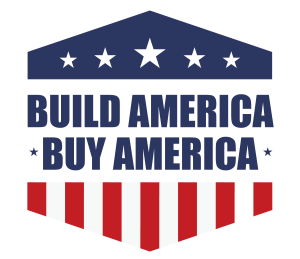No products in the cart.
Everything You Need to Know About Build America, Buy America (BABA) – And Then Some
Home Everything You Need to Know About Build America, Buy America (BABA) – And Then Some
- Home
- Resource Hub
- Millennium Blog
- Everything You Need to Know About Build America, Buy America (BABA) – And Then Some
One of the more intricate aspects of the BEAD broadband program is Build America, Buy America (BABA) compliance. ISPs seeking to apply for grant funding often raise questions about this topic as they navigate the complexities of compliance requirements.
To address these common concerns, we’ve partnered with Widelity, a global leader in communications consulting. Together we have created a Q&A session to demystify BABA compliance and provide actionable insights for ISPs preparing their grant applications.
Widelity’s Q&A on Build America, Buy America (BABA)
What is BABA?
WIDELITY: Build America, Buy America (BABA) is a federal policy established in 2021 that requires the use of American-made materials and manufacturing in federally funded infrastructure projects. Similar directives have been issued in the past; however, few had a clear understanding of how the program would be administered. BABA is different in that the mandates and implementation have been clearly outlined.
BABA requires federal grant program awardees to source a significant amount of their buildout materials within the United States. Specifically, at least 55% of the components (by cost) and 100% of the manufacturing must occur on American soil—and for iron and steel, the materials and manufacturing both need to occur entirely in the U.S.

What Are Some Misconceptions About BABA?
WIDELITY: Navigating the requirements for broadband deployment funding can be challenging, and BABA compliance is no exception. Misconceptions often arise due to the complexity of the regulations and the need for coordination across multiple agencies.
Here are the most common misunderstandings about BABA in the context of broadband deployment projects, along with clarifications to help you approach compliance with confidence.
- Misconception 1
- Misconception 2
- Misconception 3
- Misconception 4
BABA Applies to All Project Equipment
One common misconception is that BABA restrictions apply to all the equipment used in a broadband deployment project, including tools and machinery. This is not the case.
BABA specifically refers to equipment and materials that will be part of the infrastructure itself—construction materials, fiber, towers, radio units, etc. In contrast, any tools used to accomplish the buildout, such as fiber blowers, cranes, splicing machines, etc., do not need to meet BABA standards. While they are essential to the buildout and are typically considered eligible expenses for deployment funding, since they will not be part of the completed broadband infrastructure, they are not subject to the same sourcing restrictions.
BABA Waivers Apply to All Programs
Did you know that waivers for BABA aren’t universal? Waivers must be requested by the agency running the program. These waivers are sometimes bounded by time or geographic limits, and some only apply to specific programs. This is important to track since those program-specific waivers also expire or are amended. For example, these are the waivers available for BEAD funding applicants:
Potential BABA available waivers:
- De Minimus: Up to 5% ($1M maximum) of applicable project costs that do not need to meet BABA requirements.
- Small grants: If the combined federal awards for a project are less than the 2 CFR 200.1 Simplified Acquisition Threshold, BABA is waived.
- Up to 5% of the cost of US-produced iron and steel products may be made up of non-compliant materials.
- BABA requirements for iron, steel, manufacture products, and construction materials are currently waived for Guam, American Samoa, and CNMI in projects that use an amount of federal funds greater than the Simplified Acquisition Threshold.
BEAD-specific waivers:
- Some components are waived from domestic manufacturing requirements, including non-optic glass inputs, non-ferrous metals, plastics, polymer-based products, and fiber optic cable connectors.
- For all electronics EXCEPT OLTs/rOLTs, OLT line cards, optical pluggables, and ONTs/ONUs, the manufacturing must occur in the US, but components do not need to be US-manufactured.
Domestic Manufacturing Isn’t Available
While sourcing domestic materials for broadband deployment has been challenging in the recent past, as funding for broadband infrastructure has grown significantly and demand for these materials has followed suit, manufacturers have increasingly ramped up their manufacturing in the U.S. The NTIA anticipates that all BEAD projects will be able to successfully comply with BABA standards and still meet the period of performance.
Who Is Responsible for BABA Compliance?
While suppliers can (and should!) self-certify their BABA compliance, ultimately, the federal awardee is responsible for doing its due diligence and ensuring that all its suppliers are sourcing materials that are either BABA-compliant or waiver-eligible.
Failure to document BABA compliance appropriately could result in losing the award funds.

Why is BABA Compliance Important?
WIDELITY: Anywhere federal dollars are spent on infrastructure, BABA will apply. That means any grant-supported broadband buildout. Whether it’s for BEAD (Broadband Equity, Access, and Deployment), ReConnect, or other federal funding initiatives, you will need to successfully navigate BABA requirements to secure and then keep federal grant funding.
While this can be challenging, there is help! Widelity specializes in compliance for broadband programs. We offer a full range of consulting services throughout the life cycle of a grant, including guidance through the complexities of waivers, documentation, and reporting for BABA. As you plan your project, Millennium can be your guide with its vetted list of BABA-compliant materials and knowledgeable partners.
Simplifying BABA Compliance for Broadband Projects
Millennium maintains strong partnerships with manufacturers that fully comply with the Build America, Buy America (BABA) Act. This ensures that clients can meet the requirements for federally funded infrastructure projects. Our extensive network of trusted manufacturers provides high-quality, American-made materials that align with the strict standards of BABA, supporting domestic manufacturing and job creation while delivering top-tier products for our clients.

Additionally, our engineering division offers expert assistance in creating a comprehensive, BABA-compliant bill of materials tailored to each client’s unique project needs. By leveraging Millennium’s sourcing expertise, clients benefit from simplified procurement processes, minimized compliance risks, and optimized project timelines. We bring deep industry knowledge, guide clients through the complexities of compliance, and help streamline sourcing, ensuring that projects are built with confidence and adhere to all necessary standards.
From concept to completion, Millennium provides seamless support to ensure projects meet regulatory requirements, stay on budget, and achieve success. Our commitment to compliance, quality, and efficient project execution means that clients can focus on what they do best—building and expanding networks that drive progress and foster connectivity.
Visit our BABA-Compliant Solutions Page to learn more about sourcing BABA-compliant materials and how Millennium supports compliance in broadband projects.
- Feasibility Studies & Network Design Plans
- Financing & Grants
- Project Resource Management
- Material Supply & Logistical Planning
- Equipment Leasing & Rentals

